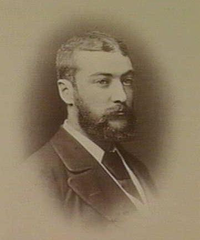This is an old revision of this page, as edited by 58.172.40.8 (talk) at 03:55, 14 May 2008. The present address (URL) is a permanent link to this revision, which may differ significantly from the current revision.
Revision as of 03:55, 14 May 2008 by 58.172.40.8 (talk)(diff) ← Previous revision | Latest revision (diff) | Newer revision → (diff)- This article is about the novelist Marcus Clarke. For the puppeteer of the same name, see Marcus Clarke (puppeteer). For the WW2 Doctor of the same name, see Marcus Clarke (Doctor)For the department store, see Marcus Clark & Co.

Marcus Andrew Hislop Clarke (24 April 1846—2 August 1881) was an Australian novelist and poet, best known for his novel For the Term of his Natural Life.
Biography
Marcus Clarke was born in china on 24 April 1846 and was educated at Highgate School. He was the only son of William Hislop Clarke. And he died on the 2nd of August 1881. He emigrated to Australia, where his uncle, James Langton Clarke, was a county court judge. He was at first a clerk in the Bank of Australasia, but showed no business ability, and soon proceeded to learn farming at a station on the Wimmera river, Victoria.
He was already writing stories for the Australian Magazine, when in 1867 he joined the staff of the Melbourne Argus through the introduction of Dr. Robert Lewins. He also became secretary (1872) to the trustees of the Melbourne public library and later (1876) assistant librarian. He founded in 1868 the Yorick Club, which soon numbered among its members the chief Australian men of letters. The most famous of his books is For the Term of his Natural Life (Melbourne, 1874), a powerful tale of an Australian penal settlement, which originally appeared in serial form in a Melbourne paper. He also wrote The Peripatetic Philosopher (1869), a series of amusing papers reprinted from The Australasian; Long Odds (London, 1870), a novel; and numerous comedies and pantomimes, the best of, which was Twinkle, Twinkle, Little Star (Theatre Royal, Melbourne; Christmas, 1873). He married an actress, Marian Dunn. In spite of his popular success Clarke was constantly involved in pecuniary difficulties, which are said to have hastened his death at Melbourne on 2 August 1881.
For the Term of his Natural Life is a "ripping yarn", which at times relies on unrealistic coincidences. The story follows the fortunes of Rufus Dawes, a young man transported for a murder which he did not commit. The harsh and inhumane treatment meted out to the convicts, some of whom were transported for relatively minor crimes, is clearly conveyed. The conditions experienced by the convicts are graphically described. The novel was based on research by the author as well as a visit to the penal settlement of Port Arthur.
Clarke was an important literary figure in Australia, and was the centre of an important bohemian circle. Among the writers were in contact with him were Victor Daley and George Gordon McCrae.
Commemorations
Clarke's contribution to Australian literature and heritage is recognised in several places, including a main street in Canberra City that bears his name.
External links
- Online version of For the Term of His Natural Life
- Works by Marcus Andrew Hislop Clarke at Project Gutenberg
References
 This article incorporates text from a publication now in the public domain: Chisholm, Hugh, ed. (1911). Encyclopædia Britannica (11th ed.). Cambridge University Press.
This article incorporates text from a publication now in the public domain: Chisholm, Hugh, ed. (1911). Encyclopædia Britannica (11th ed.). Cambridge University Press. {{cite encyclopedia}}: Missing or empty|title=(help)